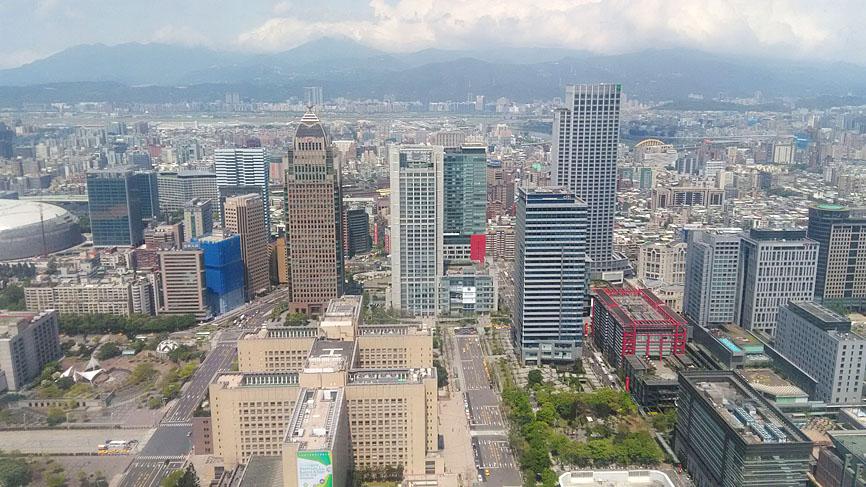Taiwan’s commercial property transactions more than doubled to US$2.6 billion last quarter, making it the sixth largest market in the Asia-Pacific region, Real Capital Analytics Inc (RCA) said in a report on Tuesday.
The increase in the nation came while the region saw a 38 percent decline during the same period, the report added.
The sale of a hotel in Taipei for nearly US$1 billion contributed largely to the upturn, the analyst said, adding that real-estate transactions in the industrial sector were strong on the back of robust trading.

Photo: CNA
Taiwan also climbed ahead of Singapore on the leaderboard of most active markets in the region, it said, adding that the first nine months of the year saw sales of US$3.9 billion.
“The escalation of trade tensions between China and the US has resulted in another wave of investment into manufacturing facilities across Asia. Taiwan was no exception, as industrial investment spiked last quarter to US$1.3 billion, a record high for a single quarter,” RCA senior analyst for Asia Pacific Benjamin Chow said.
Taiwan’s strong performance stands in stark contrast to the overall showing in the region where sales of commercial property fell 38 percent between July and September as the COVID-19 pandemic slowed cross-border deals, RCA said.
Income-producing property sales dropped to US$26 billion, down from US$33 billion in the previous quarter and US$42.2 billion a year earlier, it said.
Industrial sector activity matched the level of last year, but all other key property types in the region declined, with hotel and retail sales seeing the sharpest drop, the firm said.
Transactions involving individual properties increased from the second quarter to US$23 billion, boosted by a small amount of high-value deals, while portfolio sales fell to levels last seen during the 2008 global financial crisis, it said.
Sales of development sites, with a majority taking place in China, grew from a year earlier, with deal volume totaling US$162 billion, an 18 percent year-on-year increase, RCA said.
“The COVID-19 pandemic will continue to hamper deal-making for cross-border investors as economic uncertainty in many markets puts many of them on hold,” RCA managing director for Asia Pacific David Green-Morgan said.
Markets with robust domestic demand — such as South Korea, Japan and China — are holding up better in the current environment, Green-Morgan said.

UNCERTAINTY: Innolux activated a stringent supply chain management mechanism, as it did during the COVID-19 pandemic, to ensure optimal inventory levels for customers Flat-panel display makers AUO Corp (友達) and Innolux Corp (群創) yesterday said that about 12 to 20 percent of their display business is at risk of potential US tariffs and that they would relocate production or shipment destinations to mitigate the levies’ effects. US tariffs would have a direct impact of US$200 million on AUO’s revenue, company chairman Paul Peng (彭雙浪) told reporters on the sidelines of the Touch Taiwan trade show in Taipei yesterday. That would make up about 12 percent of the company’s overall revenue. To cope with the tariff uncertainty, AUO plans to allocate its production to manufacturing facilities in

TAKING STOCK: A Taiwanese cookware firm in Vietnam urged customers to assess inventory or place orders early so shipments can reach the US while tariffs are paused Taiwanese businesses in Vietnam are exploring alternatives after the White House imposed a 46 percent import duty on Vietnamese goods, following US President Donald Trump’s announcement of “reciprocal” tariffs on the US’ trading partners. Lo Shih-liang (羅世良), chairman of Brico Industry Co (裕茂工業), a Taiwanese company that manufactures cast iron cookware and stove components in Vietnam, said that more than 40 percent of his business was tied to the US market, describing the constant US policy shifts as an emotional roller coaster. “I work during the day and stay up all night watching the news. I’ve been following US news until 3am

COLLABORATION: Given Taiwan’s key position in global supply chains, the US firm is discussing strategies with local partners and clients to deal with global uncertainties Advanced Micro Devices Inc (AMD) yesterday said it is meeting with local ecosystem partners, including Taiwan Semiconductor Manufacturing Co (TSMC, 台積電), to discuss strategies, including long-term manufacturing, to navigate uncertainties such as US tariffs, as Taiwan occupies an important position in global supply chains. AMD chief executive officer Lisa Su (蘇姿丰) told reporters that Taiwan is an important part of the chip designer’s ecosystem and she is discussing with partners and customers in Taiwan to forge strong collaborations on different areas during this critical period. AMD has just become the first artificial-intelligence (AI) server chip customer of TSMC to utilize its advanced

Six years ago, LVMH’s billionaire CEO Bernard Arnault and US President Donald Trump cut the blue ribbon on a factory in rural Texas that would make designer handbags for Louis Vuitton, one of the world’s best-known luxury brands. However, since the high-profile opening, the factory has faced a host of problems limiting production, 11 former Louis Vuitton employees said. The site has consistently ranked among the worst-performing for Louis Vuitton globally, “significantly” underperforming other facilities, said three former Louis Vuitton workers and a senior industry source, who cited internal rankings shared with staff. The plant’s problems — which have not